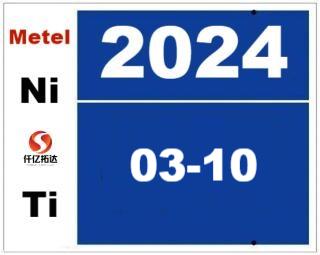ASTM F67: Titanium Sheet Requirements for Surgical Implants
—— ASTM F67: Titanium Sheet Requirements for Surgical Implants
[ 信息发布:本站 | 时间:2024-03-13 | 浏览:478 ]
ASTM F67: Titanium Sheet Requirements for Surgical Implants

ASTM F67 is a standard specification developed by the American Society for Testing and Materials (ASTM) that covers the requirements for unalloyed titanium for surgical implant applications. Specifically, ASTM F67 outlines the chemical composition, mechanical properties, dimensions, and other characteristics of titanium sheet used in the manufacture of surgical implants. Here's an overview of the key requirements specified by ASTM F67 for titanium sheet used in surgical implants:
1. Chemical Composition:
-
Elemental Composition:
- ASTM F67 specifies the chemical composition requirements for unalloyed titanium, including the maximum allowable content of elements such as iron, oxygen, nitrogen, carbon, hydrogen, and other trace impurities.
- The composition must meet the specified limits to ensure biocompatibility and corrosion resistance, which are essential for surgical implant applications.
2. Mechanical Properties:
-
Tensile Properties:
- The standard outlines the mechanical properties of titanium sheet, including tensile strength, yield strength, elongation, and reduction of area.
- These properties are determined through mechanical testing conducted according to specified procedures to ensure compliance with the requirements for surgical implants.
3. Dimensions and Tolerances:
-
Thickness and Width:
- ASTM F67 defines the permissible dimensions for titanium sheet used in surgical implants, including thickness and width.
- It also specifies the allowable tolerances for dimensions to ensure consistency and uniformity in the size and shape of the sheet products.
4. Surface Finish and Condition:
-
Surface Finish:
- The standard may include requirements for the surface finish of titanium sheet, specifying acceptable levels of roughness or smoothness.
- Surface finish requirements ensure that the sheet meets the desired aesthetic and functional standards for use in surgical implants.
5. Testing and Inspection:
-
Quality Control Testing:
- ASTM F67 outlines the testing procedures and methods for evaluating the quality and properties of titanium sheet used in surgical implants.
- Testing may include chemical analysis, mechanical testing, visual inspection, surface examination, and other non-destructive testing methods to ensure compliance with the specified requirements.
6. Marking and Identification:
-
Product Marking:
- Titanium sheet products manufactured in accordance with ASTM F67 must be marked with specific information, including the material grade, dimensions, manufacturer's name or trademark, and any applicable ASTM designation.
- Proper marking ensures traceability and identification of the product, facilitating quality control, documentation, and compliance verification.
Compliance and Certification:
-
Certification:
- Manufacturers of titanium sheet for surgical implants typically provide certification documents indicating compliance with ASTM F67 requirements.
- These documents may include material test reports (MTRs) containing detailed information on chemical composition, mechanical properties, testing results, and compliance with ASTM standards.
-
Conformance to Standards:
- Titanium sheet products that meet the requirements of ASTM F67 are considered to conform to industry standards for quality, performance, and safety.
- Compliance with ASTM specifications ensures that the titanium sheet is suitable for use in surgical implants, providing the necessary biocompatibility and mechanical properties required for implantable medical devices.
In summary, ASTM F67 establishes the requirements for titanium sheet used in surgical implants, ensuring compliance with industry standards for biocompatibility, mechanical properties, and quality. Manufacturers, suppliers, and users of titanium sheet for surgical implants rely on this standard to produce, specify, and verify the properties and quality of titanium materials used in medical applications.
Ms. Vivian (王宁宁)project manager
Shaanxi Qianyi Tuoda Technology Co., Ltd
Email:qy002@sxqytd.com www.sxqytd.com
Phone: +8618829679311
Address: Baoji City, Shaanxi Province, China
Titanium Bar| Titanium Alloy Bar| Cold Drawn Titanium Bar| Hot Rolled Titanium Bar| Cold Rolled Titanium Bar| Round Titanium Bar| Square Titanium Bar| Industrial Titanium Bar| Medical Titanium Bar| Aerospace Titanium Bar| Chemical Industry Titanium Bar| Nuclear Industry Titanium Bar| Titanium Alloy Round Bar| Titanium Alloy Square Bar| Water Treatment Titanium Bar|
